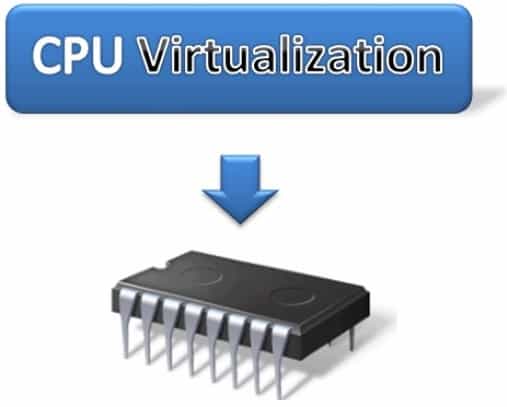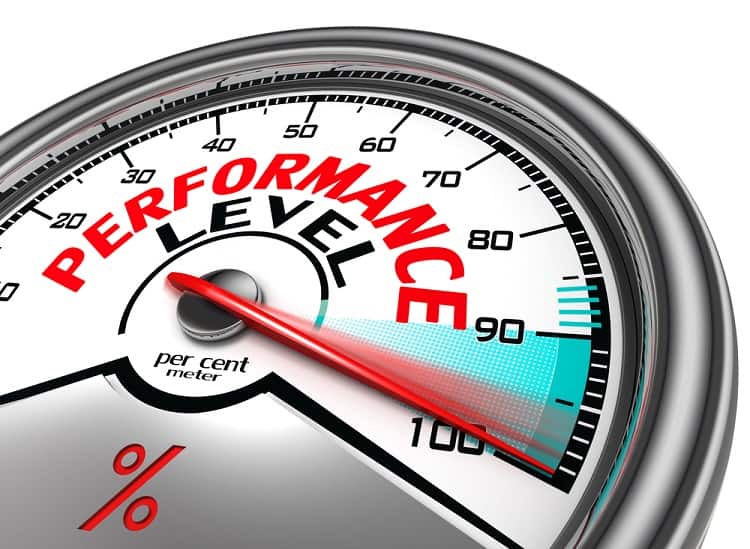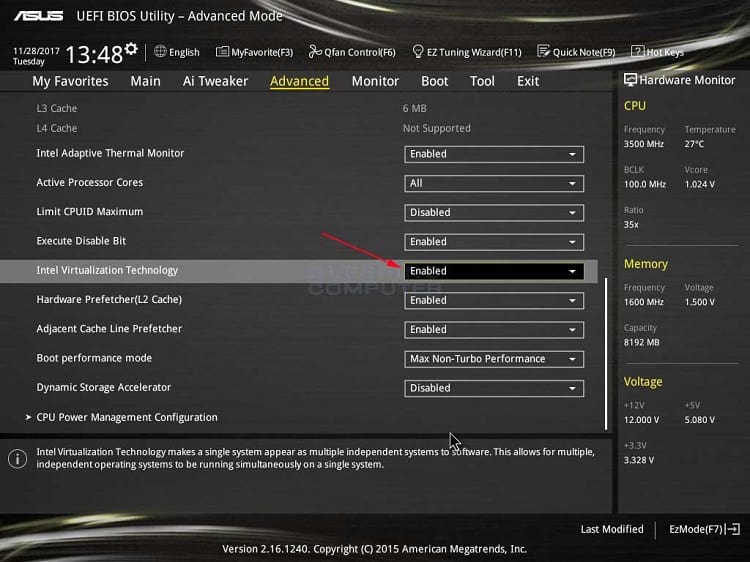- Front Case Fan Not Spinning: [3 Proven Fixes That Work - June 22, 2022
- Is 60 Degrees Celsius Hot For A CPU In 2022? [Must-Read] - June 7, 2022
- How To Handle CPU Temps Jumping: A Definitive Guide [2022] - June 2, 2022
Does CPU virtualization increase performance?
The answer is it can, but it depends on the circumstances. In some cases, CPU virtualization will reduce performance.
But in most cases, it will have no effect. This is because enabling it is only worthwhile if you use a sandbox or similar virtual machine.
These are operating systems simulated on a physical computer. Applications can run within them, separate from the main computer system.
Virtual machines are also used to test applications in a sandboxed environment. Plus, they’re helpful for applications requiring different amounts of CPU resources.
This article will provide extra information about CPU virtualization and performance. This way, you’ll be able to understand what the effects will be if you enable it with and without a virtual machine.
Once you’re informed, you’ll be able to make better choices about using CPU virtualization.
Let’s dive in!
Contents
What Is A Virtual Machine?
Virtual machines serve various functions, which we hinted at in the introduction. They’re a handy way to test out applications in a protected sandbox.
They’re also suitable for using applications requiring a legacy operating system. Resources get assigned to the virtual machine as needed.
This provides you with a range of capabilities that you’d lack without a virtual machine. One example is the ability to run programs or open files infected with viruses.
The virtual machine is self-contained, so a virus cannot spread.
What Is Virtualization On A CPU?
CPU virtualization enables the allocation of a CPU’s resources to a virtual machine. This provides each virtual machine with its own resources.

The result is a CPU’s processing power gets shared between virtual machines, enabling them to complete tasks.
What Is The Importance Of Virtualization?
Virtualization enables virtual machines to run from a single computer. This improves productivity and ensures a computer is suitable for complex multi-tasking.
Beyond a better return on investment, virtualization can also provide many other benefits. These include:
- Business scalability
- Organizational agility
- Increased workload mobility
- Greater resource availability
- Improved automation
This makes it very important for the workplace and businesses. And it can immensely help in tasks such as rendering.
Does CPU Virtualization Increase Performance?
Most of the time, CPU virtualization will not increase performance. This is because it serves no benefit for a computer system without a virtual machine.

It can often increase the CPU usage for applications that are not CPU-bound. A CPU-bound program would increase in speed if the CPU operated quicker.
If you use CPU virtualization with a virtual machine, performance will likely increase. This is because a virtual machine benefits from virtualization.
It can use more resources shared with the physical computer.
Suggested read alert: Does CPU voltage affect RAM?
Does Disabling CPU Virtualization Increase Performance?
If you’re not using a virtual machine, then it’s best to switch off CPU virtualization. It won’t benefit you in any way to use it.
Programs that aren’t run within a virtual machine will not have issues, as the setting does not apply to them. CPU virtualization only improves the performance of a virtual machine, not the physical computer.
But if you switch CPU virtualization off while running a virtual machine, its performance will decrease. In this case, I recommend switching it on because it will increase performance.
Does Virtualization Slow Down Your PC?
We’ve looked into the question, “does CPU virtualization increase performance?”. We’ve found this is only the case for virtual machines.
But some wonder whether it will slow down your computer as a whole. It depends on the hardware of your computer and how many virtual machines you’re running.
Virtualization consumes significant resources. This means you’ll need to have enough storage, CPU power, and RAM. Especially if you’re playing CPU-intensive games at high FPS.
If you’re running more than one virtual machine, you’ll need even more resources. Whether CPU virtualization gets used or not, a lack of resources will slow it down.
Should I Enable Virtualization In BIOS?
If you intend to use CPU virtualization, we think you’ll want to enable it in the BIOS so that your virtual machine can use it. Some virtual machines will not work without this setting enabled, so it’s wise to switch it on.

How to enable virtualization in the BIOS depends on your motherboard. Specific instructions should be available online for your PC.
Do I Need To Enable Virtualization In BIOS?
This is like the previous question, but the answer is more specific. If you don’t intend to use a virtual machine, you won’t need to use it. But if it does need CPU virtualization, you’ll have to switch it on.
You can test this by launching a virtual machine while logged into your computer. If it doesn’t work, you can see if your BIOS has CPU virtualization switched off. If it does, you can switch it on and try again.
What Are The Advantages Of Virtualization?
As we mentioned above, there are many advantages to using virtualization. Many of these are most evident in business or at work.

But you can also enjoy using virtualization at home. Virtual machines are a valuable tool for running legacy computer programs. They’re also helpful for testing programs you’ve coded yourself.
You’ll also get peace of mind knowing what you do in the virtual machine can’t affect the rest of your computer. Anything you save in the virtual machine will also stay on a virtual hard drive.
It’s configured to appear to your computer as a physical hard drive.
What Are The Disadvantages Of Virtualization?
We’ve discovered that virtualization has several flaws you need to keep in mind. These include:
- Having a high cost of implementation across a business
- Taking up excessive computer resources
- Being less efficient as computer hardware gets accessed indirectly
FAQs
Is CPU Virtualization Good For Gaming?
CPU virtualization will not affect gaming on your physical computer. The setting won’t apply to resources used outside a virtual machine. But inside a virtual machine, you may notice some benefits to gaming performance. It depends on the game you’re playing and what CPU resources it needs within the virtual machine.
Does Virtualization Increase FPS?
The frames-per-second rate determines how smoothly a video game appears on-screen. The higher it is, the less choppy and jagged the video will appear. Virtualization has no direct effect on this. It merely enables resources to get allocated to a virtual machine. But if the resources for the virtual machine are insufficient, it could impact the frame.
Is It Good To Enable CPU Virtualization?
We’ve covered a lot of information about CPU virtualization. Its usefulness depends on the purpose you’d like to use it for. It’s irrelevant if you don’t plan on using a virtual machine. But if you do wish to use one, then it’s valuable to enable it so that performance gets optimized. You can learn more about how CPU virtualization works in this 4-minute clip.
Is Turning On Virtualization Bad?
Not necessarily. As I’ve discussed in the article, it depends on your circumstances. But if you do switch it on without using a virtual machine, it probably won’t make a noticeable difference. If you have an older computer, there is a higher chance of it causing issues, but it’s still unlikely.


![Does CPU Matter For Streaming In 2022? [A Definitive Guide] Does CPU Matter For Streaming In 2022? [A Definitive Guide]](https://maximum-tech.net/wp-content/uploads/2022/05/Does-CPU-Matter-For-Streaming-150x150.jpg)
![How To Know If CPU Is Dead? [A Comprehensive Guide 2022] How To Know If CPU Is Dead? [A Comprehensive Guide 2022]](https://maximum-tech.net/wp-content/uploads/2022/04/How-To-Know-If-CPU-Is-Dead-150x150.jpg)
![Is Fortnite CPU Or GPU Heavy In 2022? [A Definitive Guide] Is Fortnite CPU Or GPU Heavy In 2022? [A Definitive Guide]](https://maximum-tech.net/wp-content/uploads/2022/05/Is-Fortnite-CPU-Or-GPU-Heavy-150x150.jpg)
![Does CPU Affect Download Speed for PCs? [2022 Full Guide] Does CPU Affect Download Speed for PCs? [2022 Full Guide]](https://maximum-tech.net/wp-content/uploads/2022/05/Does-CPU-Affect-Download-Speed-for-PCs-150x150.jpg)
![Best CPU for Minecraft In 2022 [7 Worthy Picks Reviewed] Best CPU for Minecraft In 2022 [7 Worthy Picks Reviewed]](https://maximum-tech.net/wp-content/uploads/2022/04/best-cpu-for-minecraft-150x150.jpg)
